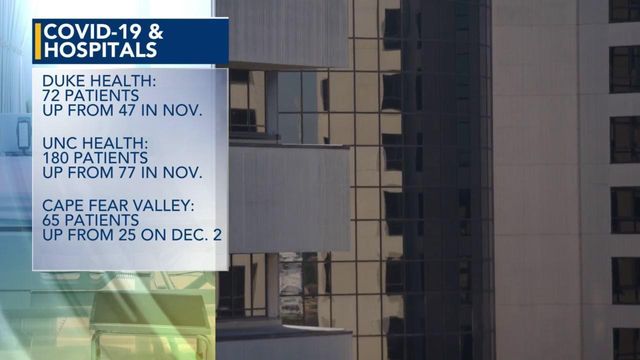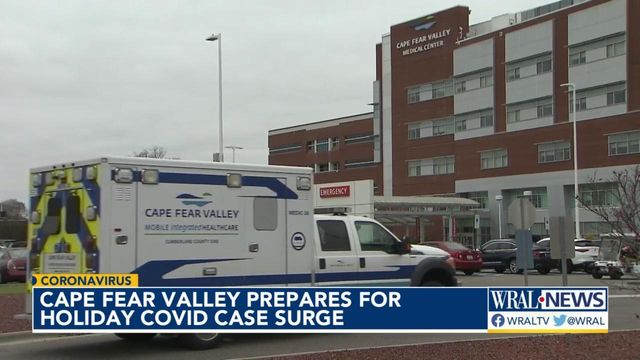100% of Duke Health patients in ICU or on life-saving treatment are unvaccinated, hospital cases rising
Duke Health tells WRAL News that 100% of COVID-19 patients in the ICU or on life-saving treatment are unvaccinated.
Posted — UpdatedHospitalizations peaked last January at almost 4,000 and again in September with the spread of the delta variant at about 3,800. With the omicron variant spreading quickly across the United States, health officials are preparing for another surge.
"It's for my health and my baby's health," said Rosemary Atkinson, a Nash County resident who was at a local clinic to get her booster shot.
62% of all North Carolinians over the age of 5 are fully vaccinated, and around 35% of those people have received a booster shot. The good news is the number of people receiving boosters is increasing in some areas, according to Dr. Marilyn Pearson, director of the Johnston County Public Health Department.
"The numbers are starting to go back up," she said. "We noticed even yesterday we started to give more booster shots."
Officials at county health departments told WRAL News they are not tracking booster shot data in the same way they are tracking initial vaccination data. In addition, the state health department also does not report county-by-county booster shot data.
- So far, Durham County has distributed more than 81,000 booster shots or extra doses of the COVID-19 vaccine for people who are immunocompromised.
- Harnett County has given out just 2,600 booster shots or third doses of the vaccine
- As of Tuesday, Wake County has distributed more than 270,000 booster shots
- Cumberland County has given out more than 1,400 third vaccine doses
- Franklin County has administered around 3,000 booster shots
Not all counties are seeing an increase in booster shots, according to Scott Lavigne, director of the Franklin County Health Department.
"We have plenty of booster vaccines available, as demand has flattened over the past month," Lavigne said. "It did pick up a bit as omicron became more publicized, but thus far vaccine-demand for boosters and initial doses remains flat in Franklin County."
More than 1,600 people are battling COVID-19 from a hospital bed in North Carolina, the highest level in the state in two months.
Duke Health tells WRAL News that 100% of their COVID-19 patients in the ICU or on life-saving treatment are unvaccinated.
A little more than a quarter of COVID-19 patients hospitalized in North Carolina are on ventilators, according to data from the North Carolina Department of Health and Human Services. In the Raleigh area, there are only 7 ICU beds left.
In some areas in North Carolina, hospitalizations have more than doubled. Duke Health saw a 50% increase in people being hospitalized for COVID-19 this month and UNC Health has seen the number of COVID-19 hospitalizations go from 77 to 180.
At Duke University Hospital, tents have been set up outside the emergency room throughout the pandemic just in case of a COVID-19 surge, and there is a chance they could be used again.
Health officials with Cape Fear Valley Medical Center said 65 people were hospitalized with coronavirus on Tuesday— an increase of 170% from Dec. 2.
Dr. Sam Fleishman, chief medical officer of Cape Fear Valley Medical Center, said that number could double again after Christmas and New Years.
"We don't know what omicron will bring to us either, at this point we think that most of this is delta," he said.
The chief medical officer at Duke University Hospital said, although they are prepared to handle what may come, a big concern right now is staffing of health care workers.
Many areas in North Carolina that are seeing more COVID-19 hospitalizations also have low vaccination rates, state data shows. More than 13% COVID-19 tests conducted in Cumberland County over the past day have come back positive and around 55% of residents there are vaccinated, according to CDC data.
The staff at Cape Fear Valley Medical Center has been fighting COVID-19 for nearly two years now. And while they are exhausted, Fleishman says they are dedicated.
WRAL Fayetteville reporter Gilbert Baez was hospitalized at Cape Fear Valley Medical Center with the virus in late August.
"I know exactly what's happening behind the doors of the emergency room right now," Baez said. "You've got doctors, you've got nurses, you've got staff rolling up their sleeves to go to battle."
He said he knows firsthand how caring and incredible the staff are.
"Doctors said the COVID-19 vaccine saved my life, but I know the dedicated nurses and staff lifted my spirits," Baez said.
• Credits
Copyright 2024 by Capitol Broadcasting Company. All rights reserved. This material may not be published, broadcast, rewritten or redistributed.






